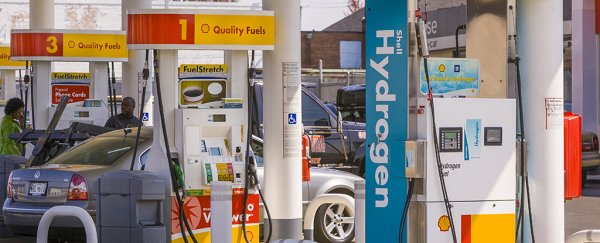Hydrogen has huge potential as a clean energy source, but so far we haven't been able to make fuel cells cheaply or efficiently enough. Now scientists are using quantum technology to explore how solar power could unlock all that potential.
The key is in using nanoparticles to boost the efficiency of photoelectrochemical cells, or PECs – the panels that handle the job of converting water to hydrogen and oxygen through the process of electrolysis.
According to the researchers from Lancaster University in the UK, PECs designed in a specific way could give us a way of producing hydrogen fuel cells at a cost and speed that makes them viable as a mainstream power source.
"To the authors' best knowledge, this system has never been investigated either theoretically or experimentally, and there is huge scope for further work to expand upon the results presented here," says one of the team, Manus Hayne.
The proposal is that semiconductor nanoparticles could sit between the water and the electrodes and boost the voltage that's created when the sunshine hits.
It's an idea backed up by mathematical models devised by the researchers, though they admit that some variables in their calculations mean the work better serves as the basis for future study rather than a complete solution for a hydrogen-fuelled future.
If we can crack the hydrogen conundrum, we'd have a fuel source that produces only water as a waste product. Considering some 86 percent of the world's power is still provided by carbon dioxide-spewing fossil fuels, that's a fuel source worth investigating.
That water waste can then be converted back into hydrogen and oxygen, making it the ultimate in sustainability – provided, of course, that the energy powering that conversion can be produced efficiently and sustainably too.
That's where the solar power comes in, and as an added bonus hydrogen fuel can be stored up for times when the Sun isn't shining. What's more, it can be burned directly if needed, making it suitable for remote communities.
Scientists across the world are looking at ways to produce hydrogen fuel that are kind to the environment and use materials that aren't prohibitively expensive, and once we make the breakthrough it can be an option for planes, trains, and automobiles.
Earlier this year a team from the University of Houston came up with a metaphosphate and nickel catalyst to split water into hydrogen and oxygen more cheaply and efficiently, so while the science is hard, there's a lot of hope for the future.
If we do eventually have everything from our homes to our cars powered by hydrogen, we might have the new research from the University of Lancaster to thank.
"We clearly need to transition to a renewable and low-greenhouse-gas energy infrastructure, and renewable hydrogen is expected to play an important role," says Hayne.
The research has been published in Scientific Reports.
